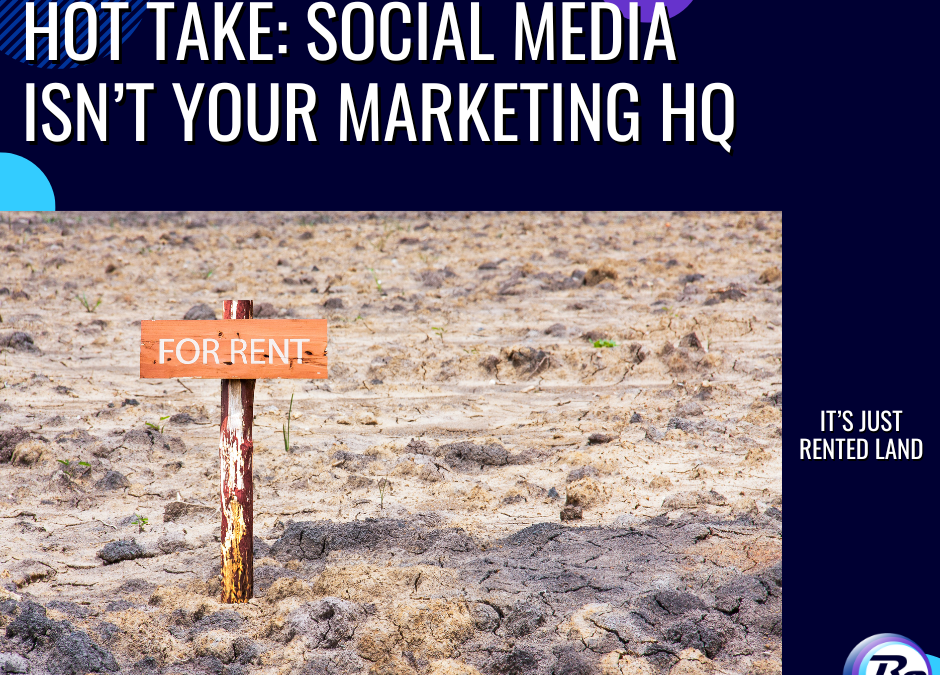The Website Isn’t Dead – It’s Evolving
Every few years, the same prediction makes the rounds: “Websites are dead. Social media is the future.”
And every year, businesses that rely only on social platforms learn the hard way that’s not true. In 2025, yes, Instagram, TikTok, LinkedIn, and whatever new app Gen Z is hyping are powerful for building awareness. But when it comes to creating Content That Converts, nothing beats a website you control.
Your website is more than a digital business card—it’s the hub of your brand, your credibility machine, and your best-performing sales funnel. Let’s break down why skipping a website in favor of social media alone could be costing you growth, authority, and revenue.
1. You Don’t Own Social Media – But You Own Your Website
Here’s the blunt truth: social media is rented land.
Algorithms shift overnight. Reach plummets. Entire accounts get suspended without warning. If Facebook decides to throttle your posts, or TikTok bans your audio, your pipeline is instantly disrupted.
Your website, however, is yours. You own the domain. You control the design. You decide how to present your message. And unlike social media feeds, your website works for you 24/7 without being at the mercy of platform politics.
When you build Content That Converts on your website—blogs, landing pages, service breakdowns, case studies—you’re building digital equity. It’s your marketing foundation, and no algorithm can pull it out from under you.
2. Your Website Builds Instant Credibility
Let’s be real: a business with only a Facebook page screams “side hustle.”
Consumers in 2025 are savvy. Before they spend, they want reassurance that you’re legitimate, invested, and trustworthy. A professional website delivers exactly that.
-
Trust Factor: Over 80% of consumers say they trust a business more if it has a website.
-
Perception Factor: Clean design, professional copy, and easy navigation signal that you’re established.
-
Conversion Factor: Contact forms, chat support, and case studies directly drive action.
Your site isn’t just a branding tool—it’s the first filter that separates serious businesses from fly-by-night players.
3. SEO Still Beats Social Reach for Conversions
Social posts are fleeting. They hit, they fade, they get buried in feeds. SEO, on the other hand, is the gift that keeps on giving.
Think about it: a single blog post optimized for Content That Converts can bring you traffic for years. It’s not unusual for one well-written piece to outperform an entire year of social posts in terms of leads.
With the rise of AI-driven search (hello, Google Gemini and ChatGPT plug-ins), websites are the first source pulled for accurate business data. If you’re not showing up in search, you’re invisible to customers actively looking for your solution.
Bottom line: social media generates awareness, but search engines generate intent. And intent converts.
4. Websites Are Built for Conversion Paths
Social posts are great for engagement—but let’s be honest, how easy is it to buy directly from an Instagram caption? Clunky. Distracting. Often full of hoops.
A website, however, gives you control over the conversion journey. You can design clear funnels that guide visitors step by step:
-
Landing page → Lead magnet → Email nurture sequence → Sale
-
Service page → Testimonial section → Call-to-action button → Booking form
When every page is strategically designed with Content That Converts, you’re not just posting into the void—you’re guiding action. That’s the difference between followers and paying clients.
5. Websites Future-Proof Your Brand
Here’s the thing about trends: they move fast. Remember Clubhouse? Vine? MySpace? All once “the future” of marketing—now gone.
Your website is future-proof. It adapts with technology. In 2025, websites aren’t static—they integrate with AI chatbots, sync with CRMs, optimize for voice search, and deliver personalized experiences.
Social platforms come and go, but a well-maintained site keeps evolving. It ensures your brand doesn’t vanish with the next digital trend shift.
6. Websites Anchor All Marketing Channels
Think of your website as the hub, and every other platform as a spoke:
-
Social media → Drives traffic to your site.
-
Email campaigns → Link back to blogs or offers on your site.
-
Ads → Point to optimized landing pages.
-
Podcasts, guest spots, PR → Direct audiences to your site.
Without a website, your marketing has no anchor. Everything floats loosely with no centralized destination. And when there’s no central hub, you lose opportunities to deliver Content That Converts across channels.
7. Websites Provide Analytics You Actually Need
Social platforms give you surface-level metrics: likes, shares, followers. But these don’t tell you the full story of conversion.
Your website, paired with tools like Google Analytics 4 or AI-driven insights, gives you deep data:
-
Where visitors come from
-
How long they stay
-
What pages they click
-
Which funnels lead to sales
This data allows you to continuously refine your Content That Converts, improving ROI month after month. Social alone? You’re left guessing.
8. Your Website Makes You Searchable Beyond Social
People don’t just “Facebook” a business—they Google it.
If you’re relying solely on social media, you’re limiting your discoverability. A professional website ensures your brand shows up when someone searches for:
-
“Best [service] near me”
-
“[Your niche] tips”
-
“[Your brand] reviews”
Without a site, you’re invisible to people who aren’t already following you. With a site, you’re capturing intent-driven leads who are ready to buy.
How to Create a Website That Delivers Content That Converts
So now that we’ve established why websites are still non-negotiable in 2025, let’s talk about building one that actually works:
-
Focus on User Experience (UX). Fast load times, clean navigation, and mobile optimization are no longer optional.
-
Prioritize Content That Converts. Every page should have a clear purpose—whether it’s to educate, build trust, or drive action.
-
Integrate AI Wisely. Chatbots, personalization, and voice search optimization enhance engagement.
-
Maintain Regularly. Security patches, plugin updates, and performance checks protect your investment.
-
Tell Your Brand Story. Your website is your space to share your mission, values, and personality beyond 280 characters.
Don’t Rent Your Future
In 2025, your website is still your most powerful marketing tool. Social media is important for reach, but it’s not enough. If you want to build authority, create Content That Converts, and own your brand’s digital destiny, your website is non-negotiable.
👉 Social is the handshake. Your website is the business meeting. Without it, you’re leaving money—and trust—on the table.
So ask yourself: is your website doing the heavy lifting, or are you relying too much on rented platforms? Because your brand deserves more than a feed—it deserves a home.


Recent Comments